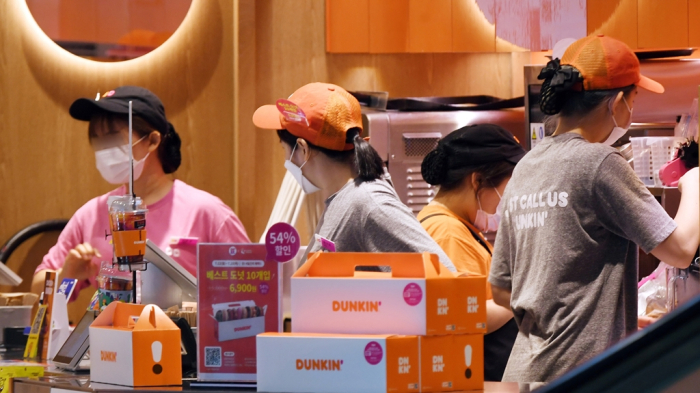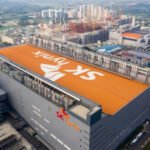
South Korea’s long-dormant consumer sector is showing signs of revival, as shoppers – once paralyzed by political uncertainty – return to stores, cinemas and hotels in increasing numbers.
Data from multiple sectors point to a marked rebound in domestic spending following the June 3 presidential election, supported by rising property asset prices and renewed government efforts to stimulate consumption.
Spending is rising across the retail sector, including consumer goods, suggesting that the protracted downturn in domestic demand is bottoming out.
According to the Korean alternative data platform KED Aicel on Wednesday, convenience store chain CU, operated by BGF Retail Co., saw consumer card spending jump 17.4% on-year to 167.5 billion won ($122 million) in the second week of June – the fastest pace since March 2024.

The boost comes after a months-long consumption freeze triggered by the political instability following the unsuccessful martial law declaration in December by then-President Yoon Suk Yeol and his ousting.
FASHION, MOVIES & LUXURIES
Data showed a widespread shift in consumer behavior.
Fashion retailer F&F Co. – operator of brands such as MLB and Discovery –posted a 44% on-year rise to 5 billion won in consumer card transactions in the June 8-14 week.
CJ CGV, the country’s largest cinema chain, reported double-digit growth in online ticket purchases for two consecutive weeks – the first such stretch in seven months.
Luxury spending, too, has shown a rebound.
Chanel’s estimated card transactions soared 46.8% on-year to 18.5 billion won last week. Burberry, Bulgari and Van Cleef & Arpels posted sales growth rates of 17.1%, 44.9% and 65.3%, respectively, over the same period.

“We’re seeing a clear post-election ‘honeymoon rally’ in consumer spending,” said Kim Dae-jong, professor of the School of Business at Sejong University. “June is usually an off-season for retail. Nevertheless, sales are rising thanks to the government’s clear stance on stimulating domestic demand and the wealth effect from soaring asset prices.”
CROWDS RETURN, QUEUES GROW
The shift in consumer spending is visible in Seoul.
Over the weekend, Seoul’s major shopping districts – Myeongdong, Seongsu and Hongdae – were packed with shoppers and tourists, despite stifling humidity.
At premium outlets, including Starfield, vehicles queuing for parking stretched for dozens of minutes, watchers said.
Sales at department stores and outlets are also on the rise.

Card transactions at Lotte Outlets rose 11.3% on-year to 81.1 billion won in the second week of June, on top of a 15.8% jump the week before, according to KED Aicel.
Hyundai Department Store Co. saw a 12.2% on-year rise in the week.
Convenience stores GS25, operated by GS Retail Co., and CU posted weekly sales growth of 3.4% and 17.4%, respectively, from the year-earlier period.
Big-box retailers such as GS The Fresh and Lotte Shopping Co., which closely works with Lotte Mart, Lotte Department Store and Lotte Hi-Mart, saw their sales grew 18.4% and 14%, respectively.
The hotel industry – long hobbled by weak domestic travel – has likewise rebounded.
Weekly sales at Hotel Shilla, Walkerhill Hotel and Grand InterContinental Seoul Parnas rose 55.8%, 24.4% and 38.1%, respectively.

The sales growth was fueled by postponed social gatherings and a rise in domestic travel post-election, analysts said.
“Evening reservations for top hotel restaurants are fully booked for the next few months,” said a hotel executive in Seoul.
WEALTH EFFECT
Analysts said the resurgent consumption is also closely linked to rising stocks and asset values.
The main bourse’s benchmark Kospi Index surged more than 9% in the nine trading sessions following the election, pushing toward the psychologically important 3,000 points.
Property prices in Seoul have steadily climbed, particularly in riverside districts. The psychological effect of these gains, dubbed the wealth illusion, is prompting consumers to loosen their purse strings.

“People feel richer when they see their stock portfolios and property values spike, even if disposable income hasn’t technically risen,” said Sejong University’s Kim. “That perceived gain, combined with pro-consumer policy signals, has awakened a frozen spending mindset.”
Online platforms have been key beneficiaries.
Coupang Eats, a food delivery app operated by Korea’s No. 1 e-commerce platform Coupang Inc., saw an all-time high in user card spending last week, with an 89.9% on-year jump to 160.1 billion won. Parent company Coupang saw card transactions rise 28.4%.
Naver Financial, the fintech arm of online giant Naver Corp., posted on-year sales growth of 11.4% to 662.4 billion won last week.

Online fashion marketplace Musinsa logged a 31.8% gain to 49.6 billion won – its highest weekly sales figure since the year-end peak season.
Yet, not all signs point to unbridled optimism.
Industry officials are concerned about potential regulatory moves by the new Lee Jae-myung administration.
“We may be seeing the end of the longest consumption slump in years. But if the government begins clamping down on hypermarkets or platforms with new restrictions, it could quickly spook the market sentiment,” said a retail industry executive.
By Yun-Sang Ko and Hyun-jin Ra
kys@hankyung.com
In-Soo Nam edited this article.















